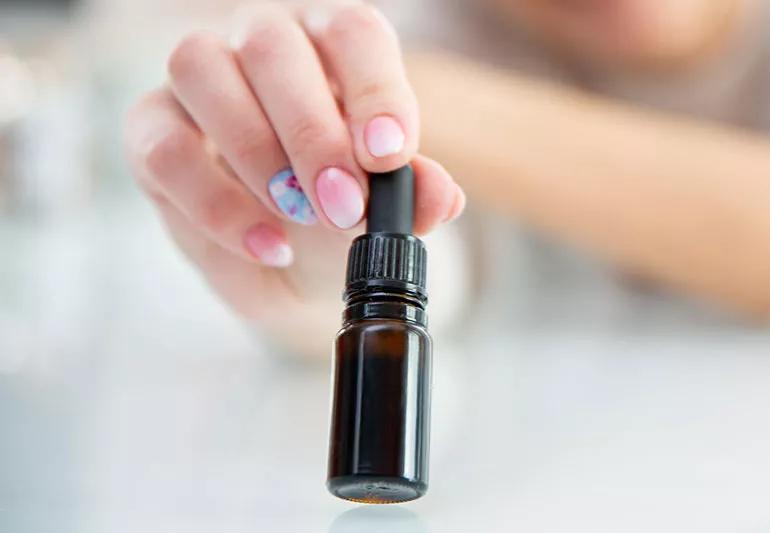Fulvic acid is a chemical compound formed by the breakdown of soil

Image content: This image is available to view online.
View image online (https://assets.clevelandclinic.org/transform/558ded44-1dd1-4c9d-a63c-9cc107280c7f/wmnHoldsFulvicAcidBottle-1352651944-770x533-1_jpg)
woman holds small bottle of liquid fulvic acid
The internet is full of health advice, alternative medicine suggestions and well-being fads (have you seen the latest TikTok trends?). And recently, fulvic acid has been making the social media rounds as a healthy supplement. But as with every wellness trend, caution should be taken before diving in.
Advertisement
Cleveland Clinic is a non-profit academic medical center. Advertising on our site helps support our mission. We do not endorse non-Cleveland Clinic products or services. Policy
According to Functional Medicine Medical Director Elizabeth Bradley, MD, there are promising signs that fulvic acid could be beneficial for people who have diabetes, Alzheimer’s disease and inflammatory issues. But there isn’t enough research yet to conclusively say it’s safe or truly beneficial. Here’s a breakdown of what we do know.
Fulvic acid is a chemical compound that’s formed when microorganisms in soil break down plant material over long periods of time. In some cases, this process can take centuries. You can find fulvic acid in clay, sand, mountain rocks and mud — and it can have different properties depending on where you source it from. Fulvic acid from sand in Israel may have different properties than peat moss in Canada or mountain rock in Colorado, for example.
Fulvic acid has most commonly been found in shilajit, a tar-like sticky substance found in Himalayan mountain rocks. For thousands of years, shilajit has been used in traditional, Eastern and Ayurvedic medicine in India and Nepal for its rejuvenating and anti-aging properties. This is assumed to be the case because shilajit contains high amounts of fulvic acid, which has antioxidant properties and helps with inflammation.
Advertisement
“The problem is that shilajit has been shown to be safe, but the dosing tends to not be regulated,” says Dr. Bradley.
The lack of regulation and limited scientific research in humans in Western medicine makes it hard to determine exactly what benefits happen with fulvic acid when taking different doses. That means there’s not a lot of information about how much is too much. When taken at higher doses, fulvic acid could have some serious side effects.
Past research, including animal studies, suggest fulvic acid could help with:
Most notably, it’s been shown to have potential for preventing chronic inflammatory diseases like diabetes. It also shows potential with neurodegenerative disorders because it may interfere with the buildup of proteins that speed up the development of brain diseases like Alzheimer’s disease.
But, according to Dr. Bradley, fulvic acid could increase oxidative damage (cell and tissue damage caused by free radicals in your body) at higher doses and have an adverse effect on your immune system, too.
“It has two sides of a coin. It can have antioxidant capabilities, but then it also has oxidant capabilities — so it can cause oxidative damage instead of preventing it,” explains Dr. Bradley.
Although some studies of fulvic acid have shown little to no side effects, those studies have remained largely small in scope. Plus, because products with fulvic acid aren’t regulated, there’s no telling what you might get.
“If you’re ingesting this from a source that you don’t know how pure it is, you could be ingesting heavy metals like mercury and arsenic,” explains Dr. Bradley.
In fact, there’ve been studies that show an increase in lead, mercury and arsenic in Ayurvedic medicines and issues with lead poisoning. For this reason, Dr. Bradley suggests waiting until more research is done before seeking fulvic acid from a functional medicine doctor. Instead, she suggests relying on other products like fish oil, which has been shown to have positive anti-inflammatory effects on conditions like rheumatoid arthritis.
“I personally would look at other products that would create similar outcomes instead of specifically going right to fulvic acid only because the studies have not been 100% conclusive in terms of knowing how much you should take,” advises Dr. Bradley.
Advertisement
It’s too early to tell if fulvic acid will be beneficial for the condition you’re looking to treat. Until Western medicine catches up on the scientific research and human clinical trials needed, it’s best to avoid fulvic acid supplements. Instead, stay on top of the current research and ask your family healthcare provider or functional medicine specialist if there are other treatments or supplements that can work in similar ways.
“I wouldn’t have patients take this just because they read something on the internet,” says Dr. Bradley. “There haven’t been enough human studies showing a true, positive effect. But there is potential and I think it should be studied.”
Advertisement

Sign up for our Health Essentials emails for expert guidance on nutrition, fitness, sleep, skin care and more.
Learn more about our editorial process.
Advertisement
Different types of yoga poses, meditation and breathwork may help you feel more emotionally balanced
There’s very little scientific evidence that this alternative medicine practice works
Spoiler alert: Science doesn’t back the numerous health claims
This traditional Chinese medicine practice may boost mental health, immune function, balance and more
This ancient form of exercise can offer a physical and mental boost
Many claims lack science-backed research, but halotherapy is popular and considered safe
This five-day exercise plan for beginners includes three days of resistance training, two days of cardio and two days of rest
If you don’t have an underlying condition, cold plunges might help ease sore muscles, decrease inflammation and even heighten your focus
Prioritize your health by managing stress, strengthening your social connections and getting quality sleep
Bolsters, blankets, pillows and blocks can offer extra support, stability and comfort
Allergies, postnasal drip, asthma or reflux could be to blame for a cough that won’t quit